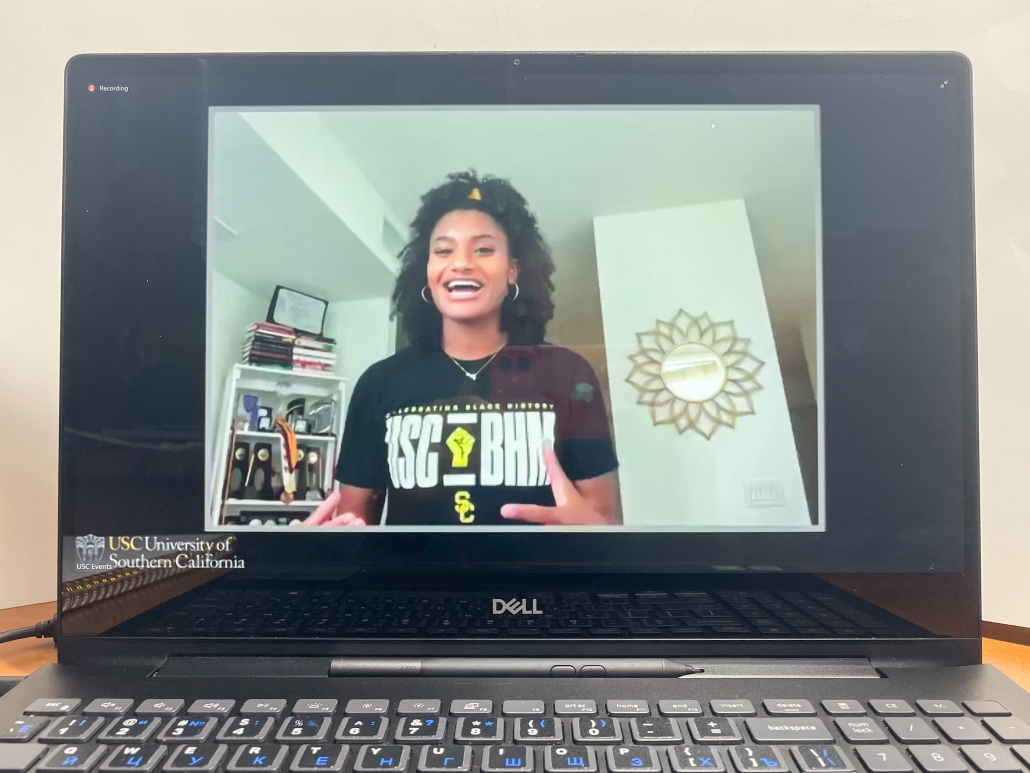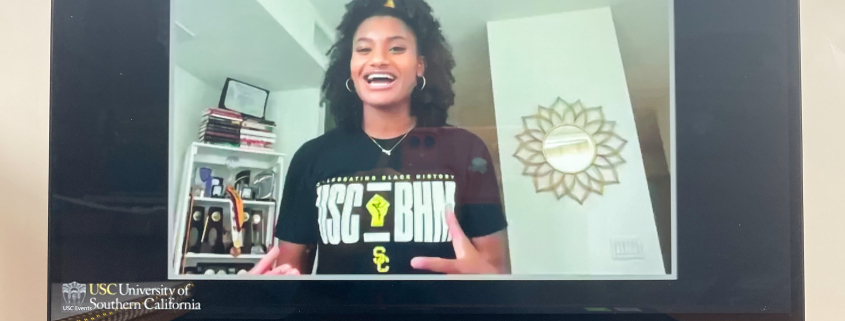Black History Month commencement places spotlight on the present

The Center for Black Cultural and Student Affairs kicked-off this year’s Black History Month through a symposium on Monday, including speeches from President Carol Folt, alumni and student leaders. (Gina Nguyen | Daily Trojan)
USC kicked off Black History Month with a symposium Monday, presenting students in attendance with a brief welcome from Center for Black Cultural and Student Affairs director Greedley F. Harris III. Over a backdrop of two Black students receiving their diplomas, Harris III announced the theme of Black History Month at USC: Black history in the making.
The event, which focused on the innovations of Black alumni and recognition of the Black USC community, was hosted by CBCSA.
Immediately following was a soulful rendition of the national anthem by Hannah Abrahim and Dominic Anzalone — both juniors majoring in performance (popular music) — performing potentially miles apart but in perfect unison.
Next in line was President Carol Folt’s speech on the history of Black innovation at USC, from the first Black USC graduate, Laura Gertrude Brown, to the renowned accomplishments of alumnus and Los Angeles architect Paul Revere Williams.
“You each have your own story to tell,” Folt said. “Representation really makes a difference … but representation is just one of the pieces of the important work that we have to do together.”
Astronaut and alumnus Charles Bolden gave the first feature speech, beginning with an account of his childhood growing up in segregated South Carolina. Clad in a red Trojan sweater, Bolden said that “Black history is American history,” and repeated himself for emphasis — the two are inextricable.
“It’s really important for all of us to understand that the system isn’t broken. It’s working exactly the way it was designed,” Bolden said. “There was probably never a better time, but also never a more challenging one, to foster the undoing and correcting of decades, if not centuries, of racism, bias and discrimination on which our nation was founded.”
Among the student speakers was Olympic athlete Anna Cockrell, a track and field member and co-president of the United Black Student Athletes Association at USC. During her speech, Cockrell expressed support for the Black Lives Matter movement and acknowledged the stories of Black innovators inside and out of the mainstream historical narrative.
“One thing I’m focusing on this month is learning about the Black icons in North Carolina — where I’m from — who desegregated and made a difference, who may not have been national celebrities but nonetheless changed the lives and the course history,” Cockrell said. “I’m really excited to celebrate Black people and the fact that we’re still here, in spite of all the things that have tried to stop us.”
Natalie Hart, a doctoral student at the Rossier School of Education, reminded students watching that Black history is not just one month — it’s happening every day.
Although she is the first in her family to pursue a doctorate, she asserted that she won’t be the last. In an interview with the Daily Trojan, Hart said that as someone who identifies as Afro-Latina, she felt it was important to inspire other people with a similar background to follow her path, too.
“I wanted to be present there and hopefully share some gems to somebody who may have been watching, that ‘Wow, that is somebody who looks like me, and she is going through the process of getting a doctorate’s degree. If she’s doing it and she’s being her authentic self, I can do it too,’” Hart said. “I hope that my presence there helps to influence someone else to know that they have the capabilities of doing it just like me, even if no one else in their family has done it before.”
Additionally, Hart backed the value of mentorship as a first generation student. Having someone who’s already gone through your own experiences makes the experience much smoother, Hart said.
“Know that you’re already establishing a new tradition, and building history from day one as soon as you step on the campus, that is an accomplishment in itself,” she said.
Associate professor of biomedical engineering Stacey Finley also offered her perspective during the event as the first Black woman to hold a tenured position at the Viterbi School of Engineering, addressing the historical lack of Black representation in STEM fields.
“The fact is, we’re accomplishing some kind of first,” she said. “We are making history, reaching milestones that our children will learn about and celebrate decades from now.”
Finley also detailed the rich volume of Black contributions to American history that remained overlooked in middle school curriculums — from pioneering Black novelist William Wells Brown to the Black cowboys and rancheros who made up nearly a quarter of the industry workers in the 1860s, according to the University of Oklahoma.
In an interview with the Daily Trojan, Finley said that during an internship at Procter & Gamble, she discovered a love for innovation that inspired her to attend graduate school. The internship’s research curriculum offered an opportunity for creativity and application by using her engineering background to answer questions in biomedicine, Finley said. For Finley, these experiences are Black history in the making: working hard on the accomplishments of the present to make an impression on future generations.
“I’m making unique and impactful contributions to the world,” she said. “In doing so, I have the ability to make history.”
To those looking to similarly distinguish themselves, Finley emphasized the effectiveness of standing out as a minority — she advised that the handful of Black students or trainees in a field use their differences as an advantage.
“You will already stand out. Don’t shy away from that … because it allows you to to shine, to highlight the work that you’re doing,” Finley said.
Mark Pearson, a part-time faculty member at the Rossier School of Education specializing in organizational change and leadership doctorate programs, started off his contribution to the symposium with a disclaimer: The attempt to take Capitol Hill was not a revolution based on illuminated values; it was inspired by hate.
Instead, Pearson implored students to start a revolution based on development by starting a family, going to university or petitioning for police reform.
In an interview with the Daily Trojan, Pearson said he wants to extend the context of Black history that’s taught in K-12 education.
“The most context that African-descended people are given [about] their existence begins off the coast of the Carolinas or on a plantation somewhere in the South,” Pearson said. “If you’re a Black kid growing up in the United States … that’s a significant challenge … how do you determine your worth, how do you determine your position in society?”
Pearson also emphasized the importance of framing, rather than painting, the picture of Black history in America.
“I want to let the students guide their own ideas of what the future should be … to find their own way of making their mark on the world,” Pearson said. “[It’s] helping somebody define their own purpose … that making of history has everything to do with this process of development within the Black community, within America.”
The commencement and subsequent events for Black History Month are produced in tandem with the CBCSA, which organized its first Black convocation last fall. Future events include a panel on the perspective and experiences of Black police officers, hosted by the Sol Price School of Public Policy in partnership with the Department of Public Safety and the Black Alumni Association. A Q&A with rapper, director and actor Ice-T will also be held on the 16th.
The most forthcoming event in USC’s Black History Month lineup is a workshop on stress and time management that will be hosted by the Center and the Kortschak Center for Learning and Creativity on Feb. 3. Additionally, USC athletics will be spotlighting prominent Black Trojans throughout the month on their website, USCBHM.com, as well as on various social media under the #USCBHM tag.

